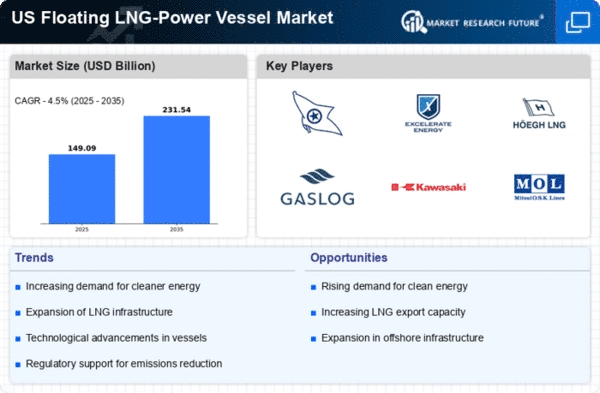Rising Energy Demand
The increasing energy demand in the US is a pivotal driver for the floating lng-power-vessel market. As the population grows and industrial activities expand, the need for reliable and efficient energy sources intensifies. The US Energy Information Administration (EIA) projects that energy consumption will rise by approximately 10% by 2030. This surge necessitates innovative solutions, such as floating lng-power vessels, which can provide flexible and scalable energy solutions. These vessels can be deployed rapidly to meet peak demand, thereby enhancing energy security. Furthermore, the floating lng-power-vessel market is likely to benefit from the shift towards cleaner energy sources, as LNG is considered a more environmentally friendly alternative to coal and oil, potentially reducing greenhouse gas emissions by up to 30%.
Strategic Partnerships
Strategic partnerships among stakeholders in the floating lng-power-vessel market are emerging as a crucial driver. Collaborations between energy companies, technology providers, and government entities facilitate knowledge sharing and resource pooling, which can accelerate market growth. These partnerships often focus on joint ventures for developing new technologies or expanding operational capabilities. The floating lng-power-vessel market benefits from such alliances, as they can lead to innovative solutions that address specific regional energy needs. Moreover, partnerships can enhance access to financing, enabling projects that might otherwise be unfeasible. As the market evolves, the formation of strategic alliances is likely to play a vital role in shaping the future landscape of the floating lng-power-vessel market.
Environmental Regulations
Stringent environmental regulations in the US are driving the floating lng-power-vessel market. The Environmental Protection Agency (EPA) has implemented regulations aimed at reducing emissions from power generation, which has led to a shift towards cleaner energy sources. Floating lng-power vessels are increasingly viewed as a viable solution to meet these regulatory requirements, as they produce lower emissions compared to traditional fossil fuel sources. The floating lng-power-vessel market is likely to see growth as companies seek to comply with these regulations while maintaining energy production. Furthermore, the potential for floating lng-power vessels to operate in remote locations allows for the reduction of emissions in areas that are otherwise reliant on more polluting energy sources, thus aligning with national goals for sustainability.
Technological Innovations
Technological innovations are reshaping the floating lng-power-vessel market. Advances in LNG storage and regasification technologies have made floating vessels more efficient and cost-effective. Innovations such as improved hull designs and automated systems enhance operational efficiency and safety. The floating lng-power-vessel market is witnessing the integration of digital technologies, including IoT and AI, which optimize vessel performance and maintenance. These advancements not only reduce operational costs but also improve the reliability of energy supply. As technology continues to evolve, the floating lng-power-vessel market is expected to attract investments aimed at further enhancing these capabilities, potentially leading to a more competitive landscape in the energy sector.
Infrastructure Development
The ongoing infrastructure development in the US is significantly influencing the floating lng-power-vessel market. Investments in port facilities and offshore terminals are essential for the effective deployment of floating lng-power vessels. The US government has allocated substantial funding for infrastructure improvements, with an estimated $1 trillion earmarked for various projects over the next decade. This investment is expected to enhance the logistical capabilities required for LNG transportation and distribution. Additionally, the floating lng-power-vessel market stands to gain from the modernization of existing facilities, which will facilitate the integration of advanced technologies and improve operational efficiency. Enhanced infrastructure not only supports the growth of the floating lng-power-vessel market but also ensures that LNG can be delivered to consumers in a timely and cost-effective manner.
















